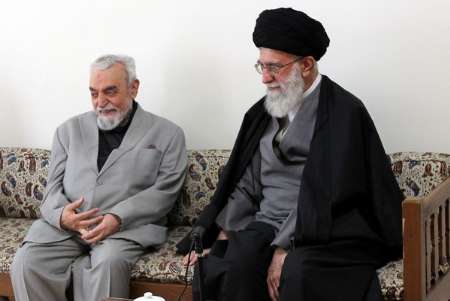November 08-2013

Habibollah Asghar-oladi, one of the major figures in the opposition to the Shah and a leading politician ever since the revolution, died Tuesday in Tehran. He was 82.
News reports said he had open-heart surgery two months ago and subsequently developed a lung infection, from which he died.
Asghar-oladi was perhaps best known as the organizer of the 1965 assassination of Prime Minister Hassan-Ali Mansur, who was gunned down as he arrived at the Majlis. Asghar-oladi was sentenced to life in prison, but after 13 years sought and received a pardon from the Shah.
After the revolution, he was commerce minister from 1980 to 1984. But he is mainly noted for his political role as an advocate of the bazaaris. He founded and for years led the Islamic Coalition Party (Motalefeh), which is viewed as the main voice of the bazaaris.
He was a traditional conservative, but surprised many when he spoke out against the house arrest of Mir-Hossain Musavi, with whom he had clashed years earlier. Reformists, who had generally disdained him, mellowed toward him as a result.
When Musavi became prime minister in 1981, he inherited Asghar-oladi as his commerce minister. The two men clashed over economic policies. Asghar-oladi advocated for a more open and liberal economic policy, while Musavi preferred more leftist policies. Asghar-oladi and other conservative ministers resigned from the cabinet over the dispute and wrote a letter of protest to Ayatollah Khomeini.
According to Fararu, the letter said, “Some in the administration are trying to make the people government oriented, and some are trying to make the government people-oriented…. If we want to get out of this dead end that we are entangled with and open the lock on the economy, we have to make the economy people-oriented.”
Khomeini, however, advised that the resignation of seven cabinet members during wartime was not a wise decision.
In the 2009 elections, Asghar-oladi supported the re-election of Mahmud Ahmadi-nejad, like other traditional conservatives. But afterward, Asgar-Oladi turned against the unruly president.
In December 2012, he made supportive statements about Musavi and fellow prisoner Mehdi Karrubi that drew criticism from conservatives in the Islamic Coalition Party. Asghar-oladi said he did not see Musavi and Karrubi as “leaders of sedition,” and referred to them as “brothers.”
Asghar-oladi’s statements were made when it was taboo for any politician to make positive comments about Musavi or Karrubi and thus raised quite a stir.
Asghar-oladi was also a member until his death of the Expediency Council, the body of three dozen men from all the accepted political factions that serves as the chief adviser on long-term policies to the Supreme Leader.
At one time, he was the head of the Imam Khomeini Relief Foundation, the country’s largest social welfare organization.
Some accounts list him among the wealthiest individuals in Iran with a net worth exceeding a billion dollars. Several members of the Asghar-oladi family appeared in Fortune magazine’s list of wealthy Muslims, with Habibollah’s brother, Asadollah Asghar-oladi, listed as possessing wealth of over $9 billion.
